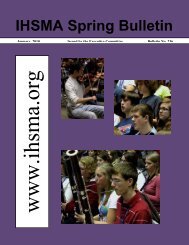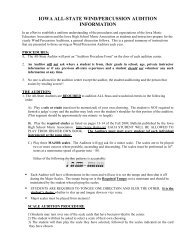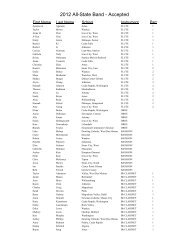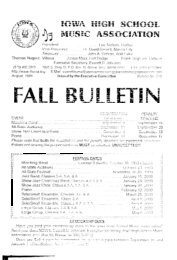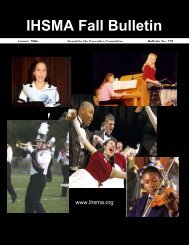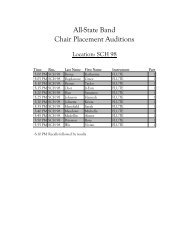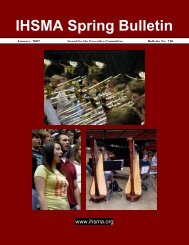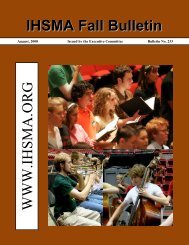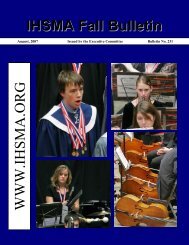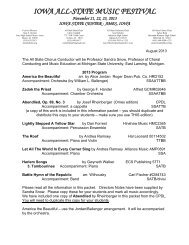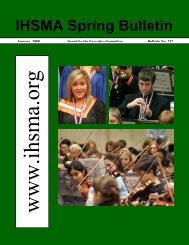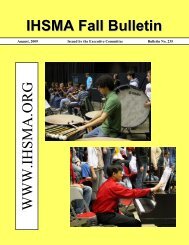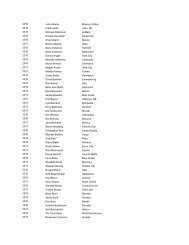Spring Bulletin No. 234 - January 2009 - Iowa High School Music ...
Spring Bulletin No. 234 - January 2009 - Iowa High School Music ...
Spring Bulletin No. 234 - January 2009 - Iowa High School Music ...
Create successful ePaper yourself
Turn your PDF publications into a flip-book with our unique Google optimized e-Paper software.
need to be punctual, dependable, and industrious.” (Gewertz, 2007).<br />
The Framework for 21st Century Learning stated, “We believe schools must move beyond<br />
a focus on basic competency in core subjects to promoting understanding of academic content<br />
at much higher levels by weaving 21st century interdisciplinary themes into core subjects”<br />
(2007). 21st century skills bridge the knowledge, skills, and dispositions of students from the<br />
core academic areas to real life application.<br />
“The primary aim of education is not to enable students to do well in school, but to help them<br />
do well in the lives they lead outside of the school.”<br />
-Ray McNulty, ICLE<br />
<strong>Iowa</strong> <strong>High</strong> <strong>School</strong> Summit, December 10, 2007<br />
The reality of building capacity for the 21st century is that we do not know what the work of<br />
the future will be like (Darling-Hammond, 2007) or how technology will influence health and<br />
financial issues. The challenge is to prepare students to think critically, to engage in mental<br />
activity, or habits of mind, that “…use facts to plan, order, and work toward an end; seek<br />
meaning or explanations; are self-reflective; and use reason to question claims and make<br />
judgments…” (<strong>No</strong>ddings, 2008). It may be that our task is not only to prepare students to “fit<br />
into the future” but to shape it. “…If the complex questions of the future are to be determined…<br />
by human beings…making one choice rather than another, we should educate youths - all of<br />
them - to join in the conversation about those choices and to influence that future…” (Meier,<br />
2008)<br />
Descriptions of what constitute essential 21st century skills are plentiful as well. In the<br />
2007 session, the <strong>Iowa</strong> Legislature established the <strong>Iowa</strong> 21st century framework as:<br />
1. employability skills<br />
2. financial literacy<br />
3. health literacy<br />
4. technology literacy<br />
Employability<br />
• Communicate and work productively with others, incorporating different<br />
perspectives and cross cultural understanding, to increase innovation and the quality of<br />
work<br />
• Adapt to various roles and responsibilities and work flexibly in climates of ambiguity<br />
and changing priorities<br />
• Demonstrate leadership skills, integrity, ethical behavior, and social responsibility<br />
while collaborating to achieve common goals<br />
• Demonstrate initiative and self-direction through high achievement and lifelong<br />
learning while exploring the ways individual talents and skills can be used for<br />
productive outcomes in personal and professional life<br />
• Demonstrate productivity and accountability by meeting high expectations<br />
(excerpted from <strong>Iowa</strong> Core Curriculum Project Lead Team report - Essential Concepts and<br />
Skill Sets, 2008)<br />
5



